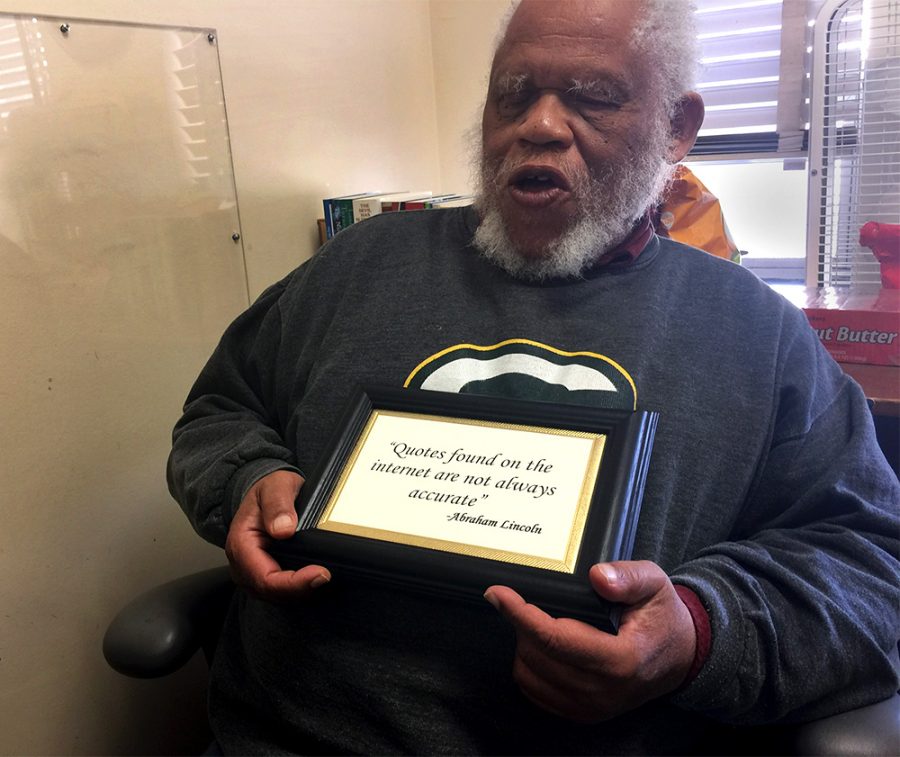‘It doesn’t mean that life is over:’ Professor talks living with blindness
Martin Hardeman, a history professor, holds a plaque he received as a gift over winter break. The plaque says, “Quotes found on the internet are not always accurate- Abraham Lincoln.” He said he thought it fit perfectly in his office, and students can learn a lot from it.
January 9, 2019
Professor of history Martin Hardeman has been teaching at Eastern since 1992, and he is completely blind.
Hardeman is a friendly face in Eastern’s history department, and he is not afraid to discuss his disability or poke fun at it.
He said he was born with glaucoma, which is an eye disease that is common for elderly people to have.
After a number of operations, Hardeman had partial vision from ages 18-40, but infections and accidents made him totally blind after that, he said.
As an instructor, Hardeman no longer has much trouble getting from place to place without any help at Coleman Hall; the process mostly consisted of trials and errors, and memorization, he said.
“All I need to know is how to get out of the building, how to find the bathroom—preferably the men’s bathroom … and then, how to get to my classes,” he said.
While he was in graduate school, Hardeman said he was faced with deciding what he should do to make a living.
He studied history and political science and eventually settled on teaching history, because political science “bored the hell” out of him, he said.
Despite his blindness, Hardeman has no problem teaching history at Eastern, but he said it has altered his life in four very negative ways.
First, he mentioned how he used to visit the Art Institute of Chicago as a college student, and now he can no longer appreciate the famous museum’s pieces, or any visual art for that matter, the same way again.
Hardeman also used to love watching movies before he became blind, and he can still listen to them, but the experience simply is not the same, he said.
He would also occasionally sit under a tree with a good book in hand and read for hours, he said.
Now, he must be read to.
Finally, he said seeing women in their dresses, which he described as an art form in and of itself, is something he will never be able to do again.
While his blindness has put an end to some of his favorite activities, Kathryn Stewart, his reading assistant and friend who has worked with him for 8 ½ years, said Hardeman never fails to impress her.
While Stewart is vital to Hardeman’s ability to read and grade student papers at Eastern, she said he is still a very independent instructor.
She said something Hardeman does exceptionally well, better than most people, is proceeding with caution.
For example, in all of her years working with Hardeman, she cannot recall the last time he ever spilled a drink.
“We’ve gone to restaurants for lunch before, and he never spills his drink; he doesn’t spill anything, which is kind of amazing. I have sighted men at home who spill things all over the place,” she said. “His other senses are so good, students wonder if he’s actually blind.”
Acknowledging his above-average tableside skills, leaving the restaurant, Hardeman said, is sometimes another story.
“As far as getting out of the restaurant goes, as I’m putting on my coat, I’m likely to kill a few people,” she said.
Stewart said if she had to pick one quality she most admires about Hardeman, it would have to be his patience.
Hardeman always understood whenever Stewart had trouble reading student papers, and she said he has never rushed her.
One thing that would make his and Stewart’s jobs easier would be if students wrote darker, larger and legibly, Hardeman said.
In any case, he said he appreciates how courteous students at Eastern have been.
Being blind has made some seemingly simple tasks difficult or sometimes impossible for Hardeman to do, but he said life goes on anyway.
“Before, (blindness) was called a disability; it was called a handicap. There are things that other people can do that (blind people) can’t do,” he said. “It doesn’t mean that life is over.”
Logan Raschke can be reached at 581-2812 or at lrraschke@eiu.edu.

















![[Thumbnail Edition] Senior Foward Macy McGlone, getsw the ball and gets the point during the first half of the game aginst Western Illinois University,, Eastern Illinois University Lost to Western Illinois University Thursday March 6 20205, 78-75 EIU lost making it the end of their season](https://www.dailyeasternnews.com/wp-content/uploads/2025/03/WBB_OVC_03_O-1-e1743361637111-1200x614.jpg)




















































